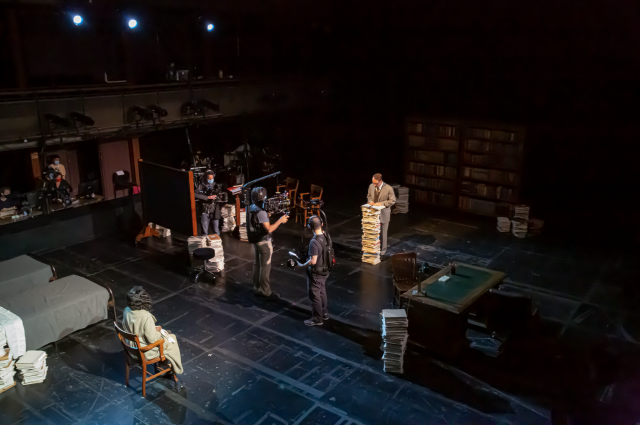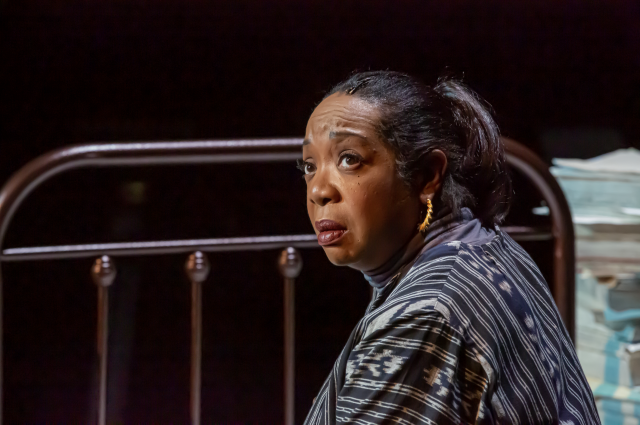
Goodman Theatre is streaming live performances of Ohio State Murders from their stage in Chicago (photo by Flint Chaney)
OHIO STATE MURDERS
Goodman Theatre online
June 17-20, $25
www.goodmantheatre.org
It might have taken a pandemic lockdown and national protests against racial injustice for eighty-nine-year-old Pittsburgh-born playwright Adrienne Kennedy to be rediscovered, but we’re all the better for it. Last November, the Round House Theatre in Maryland and the McCarter Theatre Center at Princeton kicked off “The Work of Adrienne Kennedy: Inspiration & Influence,” featuring four productions filmed onstage at the Round House. It was a deep dive into Kennedy’s growing legacy, dealing with police brutality, racism, white supremacy, sin, bigotry, and murder. One of the plays has become a touchstone for past and present societal ills that have been front and center during the Covid-19 crisis.
“I was asked to talk about the violent imagery in my work; bloodied heads, severed limbs, dead father, dead Nazis, dying Jesus,” Kennedy alter-ego Suzanne Alexander explains directly to the camera at the start of the hourlong Ohio State Murders. “The chairman said, we do want to hear about your brief years here at Ohio State but we also want you to talk about violent imagery in your stories and plays.” There’s a good reason for Kennedy’s use of violent imagery in her work.

Jacqueline Williams stars as Adrienne Kennedy alter ego Suzanne Alexander in Goodman Theatre production of Ohio State Murders (photo by Flint Chaney)
First produced by the Great Lakes Theater Festival in 1992 with Ruby Dee as Suzanne, the play made its New York premiere in 2007 at the Duke starring LisaGay Hamilton. Round House and McCarter’s 2020 online version featured Lynda Gravatt in the role, while Broadway’s Best Shows’ benefit livestream reading for the Actors Fund earlier this month had six-time Tony winner Audra McDonald as Suzanne, directed by Tony winner Kenny Leon. Now the Goodman Theatre in Chicago is presenting five live productions June 17–20 that can only be experienced in real time, as it happens, filmed live by three mobile camera operators, with no audience in the seats.
Jacqueline Williams is exquisite as Suzanne, delivering her speech in an almost matter-of-fact manner as she moves about the Goodman stage, watching scenes from her past unfold before her eyes. It’s essentially a memory play, with Suzanne detailing her time at Ohio State — Kennedy’s alma mater — when she was a student (portrayed in flashbacks by Eunice Woods) studying English with white professor Robert Hampshire (Shane Kenyon) and sharing a room with musician Iris Ann (Destini Huston) in a dorm where there are only twelve Black girls among six hundred female students. Suzanne displays a profound interest in Thomas Hardy’s Tess of the D’Urbervilles while also learning about Sergei Eisenstein’s Battleship Potemkin, but her options at college are limited because she is Black.
When she becomes pregnant, her relationships with the men in her life — her father, her friend Val (Ernest Bentley), and Hampshire — change dramatically. She is treated unfairly by dorm head Miss Dawson but is supported by her aunt Louise and widowed landlady Mrs. Tyler (all three of whom are portrayed by Dee Dee Batteast), and she grows close with law student David (Bentley) after horrific tragedy strikes.
Director Tiffany Nichole Greene (Between Riverside and Crazy, Blood at the Root) and video director Christiana Tye bring the tale to the computer screen superbly, creating a compelling hybrid presentation that has the exciting feel of live theater, or at least as much as you can get streaming at home. Greene also makes the play’s exploration of loss, trauma, mourning, race-based suppression, and unexpected violence relevant to what has occurred over the last fifteen months in America. When Hampshire reads King Arthur, the words hit hard: “‘Till the blood bespattered his stately beard. / As if he had been battering beasts to death. / Had not Sir Ewain and other great lords come up, / His brave heart would have burst then in bitter woe: / ‘Stop!’ these stern men said, ‘You are bloodying yourself!’ / Your cause of grief is cureless and cannot be remedied. You reap no respect when you wring your hands: To weep like a woman is not judged wise.’”
Director of photography Gabe Hatfield and cameramen Matt Cozza and Eugene Hahm, wearing the complex equipment on their backs, calmly navigate Arnel Sancianco’s comfortable set, which consists of library shelves, a desk and chalkboard, a dorm bedroom with two mattresses, a few chairs, and piles of books that look like they might tumble over at any moment. They follow the older Suzanne’s point of view as she shares her story, moving in and out of her old life without strong emotion but instead a kind of perceptive acceptance and admirable grace. In one memorable shot, Hampshire peers at the younger Suzanne from the shadows, suspicion palpable. The lighting is by Jason Lynch, with costumes by Mieka van der Ploeg and sound by Melanie Chen Cole. The cast is exceptional, led by Williams and Woods portraying the same character at different points in her life, revealing that time doesn’t necessary heal all wounds, especially as the world fails to change nearly enough over the decades.